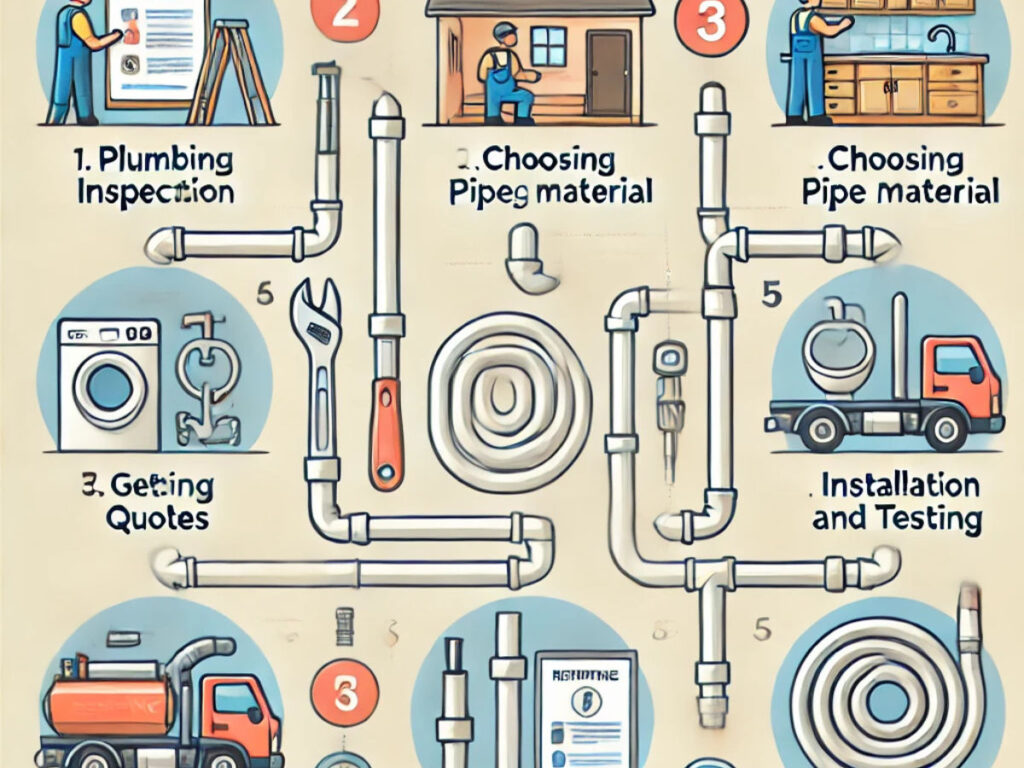If you’re dealing with frequent leaks, low water pressure, or rusty water, it might be time to repipe your home. But how much to repipe a home in the UK? Well, the answer isn’t straightforward—it depends on several factors like the size of your house, the materials used, and labor costs. In this guide, I’ll walk you through everything you need to know about how much to repipe a home, including costs, materials, and the process involved.
I once spoke to a homeowner in London who spent over £2,000 on patching up leaks over five years. Eventually, their plumber advised a full repipe, which cost them £5,000 but saved them thousands in the long run. The lesson? Sometimes, a full replacement is the more cost-effective solution.
Why Would You Need to Repipe Your Home?
Before we dive into how much to repipe a home, let’s first understand why repiping is necessary. Over time, old plumbing systems can deteriorate, leading to:
- Leaks and bursts – Small leaks can quickly become costly disasters.
- Low water pressure – Corroded pipes may constrict water flow.
- Rusty or discolored water – This is a sign of internal pipe corrosion.
- Common plumbing problems – If you find yourself calling a plumber all the time, perhaps it’s time to repipe your entire house.
How Much to Repipe a Home in the UK?
The cost of how much to repipe a home varies depending on several factors. Here’s a rough breakdown:
| House Type | Estimated Cost |
|---|---|
| 1-bedroom flat | £2,000 – £4,000 |
| 2-3 bedroom house | £4,000 – £7,000 |
| 4+ bedroom house | £7,000 – £15,000+ |
Factors That Affect the Cost
- House Size – Larger homes need more piping, increasing costs.
- Material Selection – Copper pipes are more expensive than plastic (PEX or PB pipes).
- Accessibility – If your pipes are located behind walls or beneath floors, anticipate more labour charges.
- Labour Charges – Plumbers charge according to location and experience.
- Permits & Inspections – Some areas require approvals before work can begin.
- Extent of Replacement – Full-house repiping is more expensive than partial repiping.
- Type of Plumbing System – Whether you’re using a conventional system or a more modern one affects pricing.
Cost Breakdown by Material
| Pipe Material | Pros | Cons | Average Cost per Metre |
| Copper | Durable, long-lasting | Expensive, harder to install | £20 – £30 |
| PEX (Plastic) | Flexible, affordable | Not as durable as copper | £5 – £15 |
| PB (Polybutylene) | Cost-effective, easy to install | Less durable than PEX | £5 – £12 |
For a detailed comparison of UK plumbing costs, you can check WaterSafe UK.
Step-by-Step Guide to Repiping Your Home

1. Get a Plumbing Inspection
Before making any decisions, hire a licensed plumber to assess your pipes. They’ll check for leaks, corrosion, and water pressure issues. You can find a certified plumber via the Chartered Institute of Plumbing and Heating Engineering.
2. Choose Your Pipe Material
Decide between copper, PEX, or PB pipes based on budget and durability needs.
3. Get Quotes from Multiple Plumbers
Always compare at least three quotes to get the best deal.
4. Plan the Repiping Process
A repipe can take anywhere from 2 days to 2 weeks, depending on your home’s size. Be prepared for temporary water shutoffs.
5. Installation & Testing
Your plumber will replace the pipes, reconnect fixtures, and test the new system for leaks.
6. Final Inspection & Clean-Up
After installation, ensure a final inspection is done to guarantee quality work.
How to Save Money on Repiping
- Get several quotes – Costs can differ greatly.
- Select plastic pipes – PEX and PB are cheaper than copper.
- Schedule during off-peak seasons – Winter might have lower labor costs.
- Do some prep work – If safe, remove obstacles before the plumber arrives.
- Consider a partial repipe – If only a portion of your piping requires replacement, this can save money.
Additional Considerations When Repiping Your Home
1. Disruption to Daily Life
Repiping involves tearing into walls and floors, meaning you may need to stay elsewhere during the process. Be sure to discuss timelines with your plumber.
2. Impact on Property Value
A home with brand-new plumbing can increase property value. If you’re planning to sell soon, repiping could be a worthwhile investment.
3. Energy Efficiency Benefits
Newer piping systems can improve water flow and efficiency, reducing energy costs. For example, PEX pipes retain heat better than copper, making them a good choice for homes aiming for energy efficiency.
4. Choosing the Right Plumber
Make sure your plumber is experienced in full-house repiping. Check online reviews and ask for references before hiring.
Frequently Asked Questions
How long would it take to repipe a house?
Repiping a house may take anywhere from 2 days to 2 weeks, depending on how big the house is and how accessible the pipes are.
Is repiping insured under home insurance?
It depends on your policy. Some home insurance providers may cover repiping if it’s due to accidental damage, but not for general wear and tear. Check with your insurer for details.
How can I tell if my pipes must be replaced?
Indications are low water pressure, rusty water, constant leaks, and pipes older than 50 years.
What are the top pipes for UK houses?
The most long-lasting one is copper, but PEX and PB pipes are less expensive and simpler to install.
Can I repipe my house myself?
DIY repiping is not advisable unless you are a professional plumber. Errors may result in leaks, water damage, and compliance issues.
Final Thoughts
How much to repipe a house is a considerable expense, but it’s important for having a safe and reliable water system. Prices can be different, but by being prepared and selecting the proper materials, you can make the process easier and less expensive.
If you’re facing frequent leaks or low water pressure, now might be the time to consider a full repipe. Not only will it save you money in the long run, but it will also add value to your home.
For further information about UK plumbing regulations and services, go to WaterSafe UK and CIPHE.
Did you recently repipe your house? Share your experience in the comments below!


